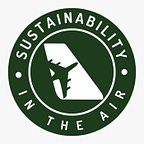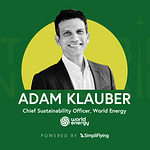In this episode, we talk to Kennedy Ricci, President of 4AIR, who shares insights into how business aviation can accelerate sustainability initiatives that could benefit the entire industry.
4AIR is a pioneer in aviation sustainability, offering private aviation stakeholders a comprehensive framework that goes beyond carbon neutrality to tackle all climate impacts. With four science-based levels and independently verified results, its platform provides a clear pathway for reducing aircraft emissions and adopting sustainable practices.
Drawing on extensive experience in aviation sustainability ratings, Ricci discusses how 4AIR has evolved to address aviation’s full environmental impact, including contrails and non-CO2 emissions.
Here are the key highlights of the conversation:
4AIR’s sustainability approach (2:23)
SAF documentation and registry efforts (6:37)
Contrail mitigation research (14:10)
Electric aircraft pilot training program (23:05)
Four-tier sustainability rating system (28:03)
Future technologies in aviation sustainability (31:09)
Business aviation as a “petri dish” for sustainable aviation innovations (33:10)
Rapid fire! (35:18)
Keep reading for a detailed overview of the episode.
Why business aviation’s role as a sustainability laboratory matters
Private aviation continues to face criticism for its much larger carbon footprint. According to a report by Transport & Environment (T&E), private jets are 5-14 times more polluting per passenger than commercial aircraft and 50 times more polluting than trains.
This necessitates swift advancement of sustainability initiatives in business aviation, and places a significant responsibility on the industry to drive forward such solutions. Ricci believes that business aviation’s nimble nature and ability to quickly adopt new technologies can make it an ideal testing ground for sustainability solutions.
“Business aviation uses about 2% of the global fuel usage of aviation... If you look at global SAF production, we’re probably taking somewhere closer to 10% to maybe even 15% of global sustainable aviation fuel (SAF) production going into business aviation. So we’re really punching above our weight and helping support SAF in its early days,” explains Ricci.
This outsized influence in SAF adoption demonstrates the sector’s potential to accelerate industry-wide sustainability initiatives. Historically, business aviation has been the launch pad for numerous innovations that later became industry standards, from winglets to advanced avionics, says Ricci. This same pattern is likely to follow in sustainability technologies and practices, he believes.
5 takeaways from the conversation
1. Comprehensive approach to aviation impact
4AIR’s approach recognises that carbon emissions are only a part of aviation’s environmental footprint, explains Ricci.
“We can look at the carbon footprint of aviation, but that’s only one-third of aviation’s impact. So it was really important, we thought, to make sure that whatever solutions we proposed would address the entire environmental impact of an aircraft.”
The company has developed a four-tier rating system that provides a pathway for aviation operators to enhance their sustainability efforts:
Level One - Bronze: Includes 100% carbon dioxide offset through verified reduction projects, including renewable energy, deforestation prevention, and nature-based sequestration;
Level Two - Silver: Expands the focus to include non-CO2 pollutants like water vapour, aerosols, and NOx, requiring 300% CO2 offset to account for these additional impacts;
Level Three - Gold: Focuses on emissions reduction through operational changes, fleet modernisation, and SAF adoption – requiring a direct 5% emissions reduction;
Level Four - Platinum: Looks to the future by requiring investment in new technologies or contributions to the 4AIR Aviation Climate Fund, which supports research on electric aircraft and cleaner fuels.
Each rating level is a simple, ready-to-use solution that can be applied to individual flight hours or gallons of fuel. It provides a complete sustainability program for companies or individuals to implement. Companies can either offer the ratings to their customers or apply it across their entire operation.
2. Contrail reduction research
One of 4AIR’s key contributions is its research on contrail reduction, which identified notable opportunities for reducing environmental impact in business aviation. Through a study of 16,888 flights, they found that adjusting just 50 of those flights could reduce the non-CO2 impact by 50%. Even more promising was the finding that 70% of contrail-producing flights could have avoided or minimised the impact of contrails through altitude adjustments.
The study also revealed stark regional differences in contrail formation: “The same airplanes were creating contrails almost twice as often in Europe as in the US. The difference came down to air traffic control (ATC) – shorter missions and a preference for lower altitudes to reduce ATC workload. In the US, there was a bit more flexibility.”
What makes these findings particularly significant is that contrail avoidance often comes with minimal CO2 trade-offs and can sometimes even lead to fuel savings. The study demonstrated that efficient flight planning could help target the most impactful contrails, particularly those whose warming effects are most certain, says Ricci.
However, perfectly climate-optimised flights remain challenging in aviation, as non-CO2 impacts don’t correlate linearly with fuel consumption and can vary depending on atmospheric conditions.
3. SAF tracking and management
4AIR has developed a comprehensive approach to SAF tracking and management that addresses the complex challenges of sustainable fuel adoption in aviation. The company helps operators navigate both physical SAF uplift and book and claim transactions, providing complete documentation and legal ownership transfer of environmental credits.
“Most SAF today comes from one to two different feedstocks with a narrow range of blends. As SAF expands to new feedstocks and higher blends, transparency about the fuel and where it came from will be critical in efforts to scale its use across the industry,” Ricci explains.
The service includes comprehensive documentation compilation for both physical and virtual SAF purchases, with monthly reporting that simplifies environmental, social and governance (ESG) and regulatory compliance. The book and claim system has proven particularly innovative, allowing SAF to be deployed at airports nearest to production points, thereby reducing transportation-related environmental impacts, says Ricci. This results in more cost-effective SAF sourcing compared to physical uplift options, he adds.
4. The Assure SAF registry platform
In May 2023, 4AIR launched the Assure SAF Registry, a blockchain-based web registry that represents a significant advancement in SAF tracking technology.
The platform serves as a SAF data exchange, providing transparency in supply chain accounting and maximising incentive value for SAF users.
As Ricci explains: “Since our launch, we’ve documented or sold over 15 million gallons of SAF, with more than 6 million gallons added to our Assure SAF registry. We’ve moved from paper-based records and Excel sheets to a more robust tracking platform.”
Assure can handle both physical and book and claim supply chains of SAF whilst protecting suppliers’ commercially sensitive data. The platform provides complete transparency about SAF type, feedstock, fuel blend, and sustainability certifications, and prevents double-counting of benefits.
“We knew that if we could solve the challenges in business aviation – given its complex fuel supply chain and ownership structure – we’d create an easier solution for airlines as well,” Ricci adds, highlighting how the platform’s capabilities extend beyond business aviation to benefit the broader industry.
5. Future-proofing aviation sustainability
Looking ahead, Ricci stresses the need for solutions that work for both current and future aircraft.
“With an average business aircraft lifespan of 46 years, any new aircraft will likely still be flying into the 2060s or even 2070s. So, we need solutions that address the existing fleet, which will still be in service by 2050 [when aviation seeks to reach net zero],” he explains.
This long-term view drives 4AIR’s investment in a range of solutions, from immediate measures like contrail avoidance to longer-term technologies such as electric aircraft and sustainable fuels. The company’s collaborations with universities and research institutions reflect its commitment to developing comprehensive, future-proof sustainability solutions for the entire aviation industry.
‘Sustainability in the Air’ is the world’s leading podcast dedicated to sustainable aviation. Through in-depth conversations with top aviation leaders, we break through the clutter and provide a clear roadmap for a net-zero future.













